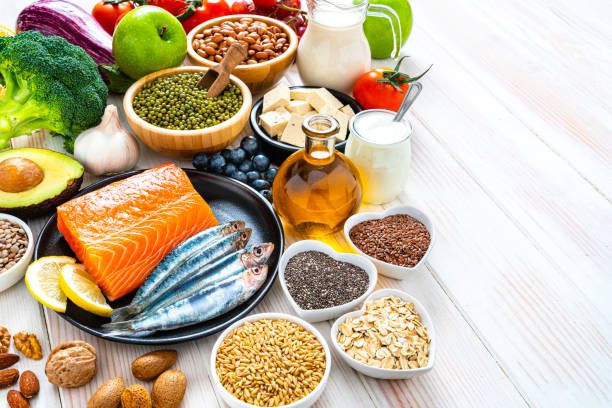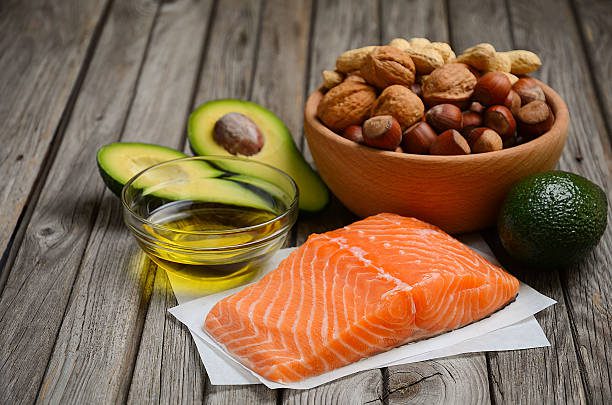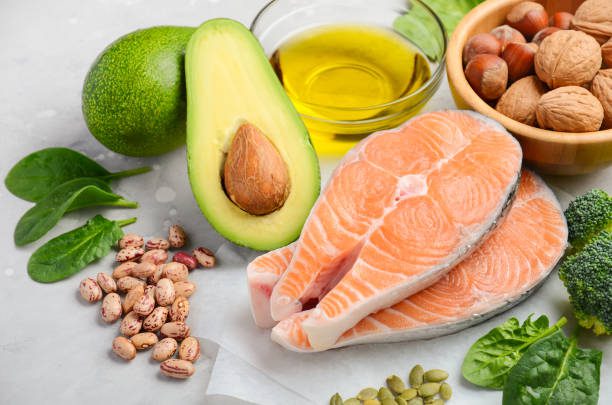⚠️ Medical Disclaimer
Important: This content is for informational and educational purposes only. It should not be used as a substitute for professional medical advice, diagnosis, or treatment. Always consult with a qualified healthcare provider before making changes to your diet, taking supplements, or if you have questions about a medical condition. Never disregard professional medical advice or delay seeking it because of information you read here.
Last Updated on February 5, 2024 by Grace Oluchi
Welcome to the interesting world of high-fat diets! In recent years, the concept of eating a higher amount of fats in our daily meals has gained much attention. While it may sound weird at first, this dietary approach has sparked questions and even earned support from various health lovers. Join me as we dive into the science, benefits, and potential thoughts of high-fat diets, all with the aim of giving you a dope digging of this exciting topic. Let’s embark on this journey together and uncover the secrets of the high-fat diet phenomenon!
What is a High Fat Diet?
A high-fat diet refers to a dietary pattern that focuses on the eating of foods rich in fats, such as oils, butter, avocados, nuts, and fatty meats. It is important to approach this concept with a balanced perspective. While a high-fat diet may sound weird at first, it’s crucial to note that not all fats are created equal. In fact, certain types of fats, like monounsaturated and polyunsaturated fats, can offer various health benefits.


When followed properly and guided by a doctor, a high-fat diet can be a valuable approach for individuals seeking specific health results. For instance, it may be used in certain healing ways or as part of a targeted weight management strategy. Moreover, adding healthy fats into one’s diet can add to better satiety, better absorption of fat-soluble vitamins, and the maintenance of important bodily functions. However, it’s important to strike a balance and ensure that the overall diet includes a wide range of nutrients from various food groups for optimal well-being.
Is The High Fat Diet Good for You?
The question of whether a high-fat diet is good for you is broad and depends on several factors. It’s important to understand that not all fats are created equal. While certain types of fats, such as saturated and trans fats, can have negative health effects when eaten in excess, other fats like monounsaturated and polyunsaturated fats can offer health benefits.
When considering a high-fat diet, it’s crucial to focus on the quality of fats eaten. A diet rich in healthy fats from sources like avocados, nuts, olive oil, and fatty fish can provide important nutrients and support various bodily functions. These healthy fats can add to better heart health, brain function, and overall well-being.
However, it’s important to strike a balance and not rely solely on high-fat foods. A healthy diet should also include a variety of nutrient-rich foods from other food groups, such as fruits, vegetables, whole grains, and lean proteins. Additionally, individual factors like overall health, metabolic conditions, and personal goals should be taken into thoughts when noting the suitability of a high-fat diet. Consulting with a doctor or registered dietitian can provide proper guidance and ensure that a high-fat diet is adopted in a way that aligns with your specific needs and promotes overall health.
How to Start the High Fat Diet.
- Understand the Basics: Before starting a high fat diet, it’s important to grasp the basics. The high fat diet, also known as a ketogenic or keto diet, focuses on eating a portion of your calories from healthy fats while you lower carbohydrates. This shift in macronutrient ratios allows your body to enter a state of ketosis, where it uses fat for fuel instead of carbohydrates. Familiarize yourself with high-fat foods such as avocados, nuts, seeds, fatty fish, olive oil, and coconut oil. Remember to consult with a doctor or nutritionist to ensure it’s a good choice for you, especially if you have any base health conditions.
- Gradual Transition: Transitioning into a high fat diet is best done slowly to allow your body to adapt. Start by reducing your intake of sugary foods, refined grains, and starchy carbohydrates. Instead, add more healthy fats into your meals and snacks. Add avocado slices to salads, use olive oil for cooking, and enjoy a handful of nuts as a snack. As you progress, lower your carbohydrate intake further and increase healthy fat sources. It’s important to listen to your body during this process, ensuring you’re getting enough nutrients and staying properly hydrated.
- Monitor and Adjust: Once you’ve started the high fat diet, pay attention to how your body responds. Everyone’s experience may vary, so it’s crucial to monitor your energy levels, digestion, and overall well-being. Additionally, consider tracking your macronutrient intake using apps or journals to ensure you’re on the desired ratio of fats, proteins, and carbohydrates. Remember, the high fat diet is not a general approach, and individual needs may differ. Regularly check and make changes as needed to find what works best for you, and always put a balanced and varied diet that includes nutrient-dense foods first.
Why Not Consider a Formal Diet?
Considering a formal dietary plan can be a wonderful step towards better overall health and well-being. A formal dietary plan provides a proper guide and structure, helping you make informed choices about what you eat. It allows you to focus on eating a balanced variety of nutrients, made for your specific needs and goals.
By following a formal dietary plan, you can ensure that you’re getting all the important nutrients your body requires, such as vitamins, minerals, proteins, and healthy fats. It can also help you manage portion sizes, control calorie intake, and control eating. A good plan can give you a sense of control over your diet, making it easier to maintain healthy habits in the long run.
Furthermore, a formal dietary plan often involves meal planning and preparation, which can be a fun and creative process. It allows you to experiment with new recipes, flavors, and ingredients, growing your culinary horizons. Additionally, when you have a clear plan in place, it becomes easier to resist temptations and make better choices, even in challenging situations.
Meal Planning.
Meal planning is a fantastic strategy that helps you arrange and optimize your meals in advance. By taking a little time to plan your meals for the week, you can reap numerous benefits. First, meal planning saves you time and stress. Instead of thinking to figure out what to cook each day, you already have a clear plan in place. This allows you to properly grocery shop and prep foods, making your days much more relaxed and fun.


Moreover, meal planning promotes better eating habits. When you plan your meals, you have the opportunity to make nutritious choices and balance your diet. You can add a variety of fruits, vegetables, whole grains, lean proteins, and healthy fats into your meals, making you get all the important nutrients your body needs. Additionally, it helps you avoid sudden or bad food choices, as you’ve already carefully picked your foods in advance.
Lastly, meal planning can save you money. By planning your meals, you can create a shopping list with specific foods, lowers the chances of overbuying or wasting food. You’ll also be less tempted to eat out or order takeout, which can be expensive. Instead, you can make use of leftovers and later use foods across multiple meals, stretching your budget further.
Meal planning is a brilliant and friendly approach to arrange your meals. It saves time, reduces stress, promotes better eating habits, and helps you save money. By taking a little time upfront to plan your meals, you can enjoy the benefits of good grocery shopping, healthy choices, and a more relaxed and fun dining experience throughout the week.
Foods to Eat on a High Fat Diet.
On a high-fat diet, it’s important to choose foods that are both nutritious and rich in healthy fats. Here are some excellent options and their reasons for addition:


- Avocados: Packed with monounsaturated fats, avocados offer a creamy texture and provide important nutrients like potassium and fiber. They can help improve heart health and promote satiety.
- Nuts and seeds: Almonds, walnuts, chia seeds, and flaxseeds are excellent sources of healthy fats, fiber, and antioxidants. They can support brain function, reduce inflammation, and help control blood sugar levels.
- Fatty fish: Salmon, mackerel, and sardines are high in omega-3 fatty acids, which have been linked to numerous health benefits. These fats support heart health, reduce inflammation, and enhance brain function.
- Olive oil: A staple of the Mediterranean diet, extra virgin olive oil is rich in monounsaturated fats and antioxidants. It can help lower cholesterol levels, reduce the risk of heart disease, and provide anti-inflammatory effects.
- Coconut oil: This tropical oil contains medium-chain triglycerides (MCTs) that are quickly absorbed and turned into energy by the body. Coconut oil may support weight loss, improve brain function, and boost immunity.
- Full-fat dairy products: Options like cheese, yogurt, and butter can be added in moderation. They provide healthy fats, fat-soluble vitamins, and minerals. However, it’s important to consider individual tolerances and choose quality sources.
- Dark chocolate: Opt for dark chocolate with a high cocoa content, as it contains healthy fats, fiber, and antioxidants. Consumed in moderation, it may have cardiovascular benefits and improve mood.
Foods to Avoid on a High Fat Diet.
On a high-fat diet, it’s important to be mindful of certain foods that are best to avoid. While the focus is on healthy fats, limiting or missing certain items can help optimize the benefits of this dietary approach. Here are some foods to avoid and their reasons:


- Processed and fried foods: These foods often contain bad trans fats, large amounts of refined oils, and additives. They can add to inflammation, weight gain, and increase risk of heart disease.
- Sugary treats and beverages: Foods high in added sugars, such as candies, sodas, and pastries, should be minimized. They not only provide empty calories but can also lead to blood sugar spikes, insulin resistance, and weight gain.
- Highly processed vegetable oils: Vegetable oils like soybean, corn, and sunflower oils are often refined and high in omega-6 fatty acids. While a small amount of omega-6 fats is necessary, large eating can promote inflammation and disrupt the balance of omega-3 to omega-6 fats.
- Low-quality meats: Processed meats like sausages, hot dogs, and deli meats are often high in bad fats, sodium, and additives. Opt for high-quality, grass-fed, or organic meats to avoid unnecessary additives and unhealthy fats.
- High-carbohydrate foods: While the focus is on healthy fats, it’s important to limit carbohydrate intake. This includes refined grains (white bread, pasta, etc.) and sugary foods. Excessive carbohydrate eating can limit the body’s ability to utilize fats for energy.
- Some dairy products: Full-fat dairy products can be eaten in moderation, but it’s important to choose quality sources. However, certain high-fat dairy products like heavy cream and cream cheese may contain additives or large saturated fats, so it’s wise to consume them less.
Health Benefits of the High Fat Diet.
The high-fat diet, when properly followed, can offer several potential health benefits. It’s important to note that individual results may vary, and seeing a doctor is advised before starting any dietary changes. Here are some possible health benefits associated with the high-fat diet:
- Enhanced weight management: Consuming healthy fats can help promote feelings of satiety, reducing overall calorie intake. Additionally, the high-fat diet may make the body utilize stored fat for energy, potentially aiding in weight loss or weight maintenance.
- Improved heart health markers: When the high-fat diet focuses healthy fats like monounsaturated and polyunsaturated fats, it may help improve heart health. These fats can positively affect cholesterol levels by increasing “good” HDL cholesterol and reducing “bad” LDL cholesterol and triglycerides.
- Increased brain function: The brain relies on healthy fats for optimal performance. By providing a steady supply of important fatty acids, the high-fat diet may support cognitive function, memory, and overall brain health.
- Better blood sugar control: Consuming healthy fats alongside controlled carbohydrate intake can help regulate blood sugar levels. This may be particularly beneficial for individuals with insulin resistance or type 2 diabetes.
- Enhanced nutrient absorption: Certain vitamins, like vitamins A, D, E, and K, are fat-soluble, meaning they require dietary fat for proper absorption. A high-fat diet can aid in the absorption of these essential vitamins, ensuring the body can utilize them effectively.
- Reduced inflammation: Some healthy fats, such as those found in olive oil and fatty fish, possess anti-inflammatory properties. By incorporating these fats into the diet, individuals may experience a reduction in chronic inflammation, which is associated with various health conditions.
Side Effects of a High Fat Diet.
The high fat diet, while popular for weight loss or certain health goals, can have side effects that are important to consider. These side effects primarily stem from the excess consumption of fats and the lack of other essential nutrients. Here are some common side effects:
- Weight gain: Consuming a high amount of fat can lead to weight gain due to the high caloric density of fats. It’s important to maintain a balanced calorie intake to avoid excessive weight gain.
- Digestive issues: High fat diets can cause digestive discomfort, including bloating, diarrhea, or constipation. This occurs because fats take longer to digest and can slow down the movement of food through the digestive system.
- Increased cholesterol levels: Excessive intake of saturated and trans fats can raise cholesterol levels, potentially leading to cardiovascular problems. It’s crucial to choose healthy fats, such as those found in nuts, avocados, and olive oil, while limiting unhealthy fats from processed foods.
- Nutrient deficiencies: A high fat diet may lack essential nutrients like vitamins, minerals, and fiber, as it often replaces other nutrient-rich foods. It’s important to ensure a well-rounded diet that includes a variety of fruits, vegetables, whole grains, and lean proteins.
- Increased risk of certain diseases: Prolonged consumption of a high fat diet, especially one rich in unhealthy fats, can increase the risk of conditions like heart disease, diabetes, and certain types of cancer. This emphasizes the need for moderation and balance.
The Key Takeaway.
The high-fat diet presents a complex and intriguing topic that has garnered significant attention in the health and nutrition community. While it may have its merits and benefits, it is crucial to approach it with caution and proper understanding. Remember, maintaining a balanced and diverse diet, coupled with regular exercise, is key to achieving overall well-being and long-term health. Always consult with a healthcare professional or registered dietitian to ensure the best dietary choices for your unique needs. Stay informed, stay curious, and enjoy your journey towards a healthier lifestyle!
How does a high-fat diet affect weight loss and body composition?
A high-fat diet can promote weight loss and changes in body composition through several mechanisms. By reducing carbohydrate intake, the body enters a state of ketosis, where it primarily burns fat for energy. This can lead to increased fat oxidation and a decrease in stored body fat. Additionally, higher fat intake can increase satiety and reduce overall calorie consumption, aiding in weight loss and improved body composition.
Are there any health risks associated with a high-fat diet?
While a high-fat diet can have potential benefits, there are also health risks to consider. Excessive intake of unhealthy fats, such as trans fats and saturated fats, can contribute to cardiovascular issues. It can also increase the risk of developing chronic conditions like heart disease. Therefore, it is important to consume healthy fats while moderating intake of less healthy fats.
Can a high-fat diet improve cognitive function and brain health?
Research suggests that a high-fat diet, may have positive effects on cognitive function and brain health. These fats are essential for the structure and function of brain cells and may support memory, learning, and overall brain health. However, more studies are needed to fully understand the impact of a high-fat diet on cognitive function.
Is a high-fat diet suitable for everyone?
A high-fat diet may not be suitable for everyone, as individual nutritional requirements and health conditions vary. People with certain medical conditions, such as pancreatitis or gallbladder issues, may need to restrict fat intake. Additionally, those with specific dietary preferences, such as vegetarians or vegans, may find it challenging to follow a high-fat diet. It is crucial to consult with a healthcare professional or registered dietitian to determine the most appropriate dietary approach for your specific needs.
Can a high-fat diet be sustainable in the long term?
The sustainability of a high-fat diet depends on various factors, including personal preference, lifestyle, and overall health goals. While some individuals may find it enjoyable and easy to maintain, others may struggle with the restrictive nature of the diet. It is important to find a balance that works for you, considering both short-term benefits and long-term sustainability. Incorporating a wide variety of nutrient-dense foods, including healthy fats, is key to ensuring a sustainable and enjoyable dietary pattern.

